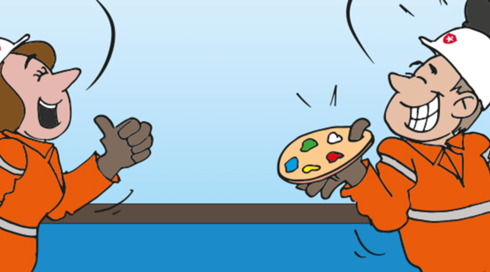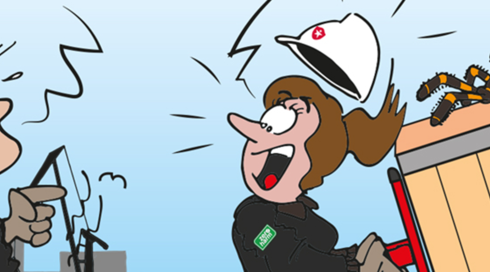2
Successful competence management is crucial in 2020 and beyond. Dingena Peddie-Theunisse of Atlas Professionals, helps professionals and (sub)contractors catching this wave. With almost a decade of her time dedicated to competence management, Dingena is a true competence expert. Next to Organisational Development Manager at Atlas Professionals, she also is member of the Competence & Training Committee of the International Marine Contractors Association (IMCA). The ideal person to give an insider view on the increased importance of offshore competence management.
“Essentially, competence is about having the ability, skills and knowledge to be able to do the job in a competent and thus safe, efficient and compliant manner,” Dingena says. “In any job competence is important, but especially in the offshore environment this is vital for safe and efficient operations.”
According to Dingena, the what - titles and years of experience - are no longer the industry’s only currency. The focus now also lies on how you have been doing something instead of only on what: did you supervise, carry out or assist? Did you receive on the job training or provided training to someone? What conditions did you work in? Successfully documenting this is where Competence Management Programmes, such as the Atlas Competence Programme (ACP), come into the conversation.
The ACP is created to assure, in a structured and integrated manner, the competence of Atlas’ professionals. This is crucial, as the offshore industry has become even more reliant on freelance crew since the downturn in Oil & Gas. “This pool of professionals generally has experience working for a range of companies, using different technologies and in varying teams.
Combined with the much more intense skill set required per professional, this poses serious demands on proven competence,” says Dingena. “With the ACP we’re identifying the gaps, which in turn enables better development of people.”
Online Competence Profiles
In order to make the process as smooth as possible for the professionals seeking verification and certification of competence, Atlas uses a digital and automated solution for the ACP. “To enhance the user experience on this journey, to better enable assessments and significantly improve privacy and data protection, we chose a more advanced solution,” says Dingena. She continues to explain that professionals have access to their online competence profiles in their so called My Atlas account. “They are the ones in charge of this practical, workable, safe and smart solution and have the support of our Competence team.”
Providing a technology-based solution like the ACP requires a fair bit of investment, she admits, but makes the company ready for the future. “The continuing move towards digitalisation in the offshore energy sector is something we fully embrace at Atlas.” Hence, she looks forward to taking an active role in the digitalisation committee of IMCA.
Operational feasibility
“Competence management is there to create a safe environment for all. The requirements clients ask do not come out of nowhere: they need to assure that all personnel, including third party contractor personnel involved, are competent for the proposed work.” This contradicts a misconception some professionals might have, she notes, that competence management is ‘just making the life of a professional difficult’. Dingena does admit that the competence requirements can get a bit out of control. “With so many different stakeholders, the number of requirements soon becomes impractical, making it very difficult to actually assess competence on the work floor. This is why guidelines such as those of IMCA are so important.”
Not only the feasibility of assessments is an issue offshore, however. Yet another specific challenge for freelance professionals is to get assessed. “We very often don’t get appraisals in when our professionals have performed well because there simply isn’t enough time. This requires continuous dialogue with our clients.”
Constant state of flux
Over the years, Atlas has responded to the practical and technical challenges faced within the field of competence in an efficient way. “To tackle the shortage of assessors, for example, we train up to 32 professionals to become an assessor. This means carrying out assessments becomes an integral part of their job and, consequently, we can give more professionals the opportunity to raise their competence levels.” There are still some challenges left, though, such as the feasibility of completing profiles for more senior professionals with extensive experience and a large track record. “Communication of the benefits of competence management and taking them along in the journey are key in this respect,” says Dingena.
“We’ll never be a hundred per cent done and have a final solution. Competence requirements will be ever-changing and evolving with so many target groups and parties involved, let alone digital developments,” she says. “You can never please everybody, but at Atlas we aim to offer the best possible solution, covering the needs of our professionals and clients while lowering costs and maintaining the high standards the global energy industries have come to expect from us. We’re committed to mitigating risk – achieving Zero Harm – through attaining and maintaining industry competence management system criteria and ensuring the continual development of our workforce.”
The Atlas Competence Programme (ACP) allows Atlas Professionals’ energy industry professionals worldwide to access, carry out assignments and upload documentation relating to their assessment, verification and certifications of competence. To participate in the ACP or to obtain more information, contact competence@atlasprofessionals.com.
.png)
.png)


